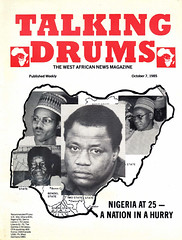Understanding Black English (Part 1)
David James Fretz
David James Fretz, a graduate student in education at the California State Polytechnic University at Pomona presents an analysis of West African linguistic patterns that have developed through the last few centuries by African Americans into what is now popularly called 'Black English'.The ethnolinguistic theory of Ebonics provides a more accurate, more sophisticated understanding of so-called "Black English", i.e. that form of speech uniquely associated with African-Americans. The ethno-linguistic theory states that "Black English" is neither dialectal English, "transformed" English, inferior English, nor in fact any sort of English at all, but is instead a distinct, patterned, independent language foreign to English, directly related to the Niger-Kordofanian language family of equatorial West Africa. Acceptance of this theory has important social and educational ramifications.
The term Ebonics (derived from the words Ebony + phonics, and hence meaning "black sounds") is a word developed by several African- American psychologists and ethnolinguists, and is used to describe, non- assumptively, those linguistic and para-linguistic traits specifically associated with African-Americans. Linguistic historians believe US Ebonics to have begun on the southern Atlantic coast of the United States in the 17th and 18th centuries, during the period of African slave importation.
The slaves were abducted largely from those areas of Africa where Niger-Kordofanian languages such as Efrik, Mande, Ibo, Twi and others were, and still are, spoken. These languages, though mutually unintelligible and syntactically distinct, nonetheless possess many fundamental syntactical or "deep structural" similarities. Forced, in their new circumstances, to live, work and communicate not only with each other, but also with their English-speaking masters, the slaves found it necessary to abandon most of their native vocabulary and replace it with the English vocabulary of their masters, albeit in a manner superficially altered to suit the basic pronunciation patterns found in West African languages.
Not abandoned, however, were the basic principles of West African thought and speech embedded in Niger-Kordofanian deep structure both fundamentally different from the thought and speech indigenous to the European-settled American South.
The existence of Niger-Kordofanian deep structure in Ebonics is the focal point of the ethnolinguistic theory. All previous attempts to deal with Ebonics phenomenon have failed either to realise or to come to terms with the existence of this fundamental pattern. The dialectical theory, one of the first attempts to deal with the Ebonics phenomenon, saw Ebonics as a dialect of Standard American English (SAE) as spoken in the American South during the slave period. In dialectical theory the slaves are said to have lost their native tongues almost completely, and to have adopted the now archaic speech of their masters.
They are said to have then continued to use this now archaic speech complete with all those changes that would naturally occur with the passage of time and with cultural isolation. Hence the differences between Ebonics and English were at first considered to be the result of simple dialectal evolution. The existence of the Niger- Kordofan deep structure in Ebonics is the focal point of the ethno-linguistic theory. All previous attempts to deal with Ebonics phenomenon have failed either to realise or to come to terms with the existence of this fundamental pattern
The transformationalist theory, the most widely accepted theory, views Ebonics as a form of SAE, one with a typical SAE structure but a transformed phonology or "surface structure". Hence the Ebonics sentence "Lou be home nex week" is seen as a contraction of "Lou'll be home next week", where the "II" and "t" are simply dropped. The structure hence is said to be the same, only the overt expression is changed.
The creolist theory claims that Ebonics is a creolized pidgin English which replaces complex SAE structure with a regularized, simplified derivative. In creolist literature, as in trans-formationalist works, words such as "omission", "deletion", "drop" and "r-lessness" are used to describe Ebonics.
That Ebonics can be explained by none of these theories is demonstrated by empirical evidence which present-day Ebonics to its Niger-Kordofanian ancestors. This evidence is of two types: phonological (sub structural) and more significantly syntactical (deep structural).
Phonological evidence
There are numerous examples of Ebonic words which, though undeniably based upon English would demonstrate by their pronunciation the Niger-Kordofanian origin of Ebonics. Examples of this so Niger-Kordofanian influence of Ebonics are myriad, far too numerous to be catalogued here. Most of the phonological evidence, however, falls into one of two major categories.Consonant Clustering Avoidance
Niger-Kordofanian languages seemingly employ consonant clusters, the syllable patterns being almost entirely of consonant-vowel-consonant or vowel-consonant-vowel variety. Hence SAE words "left", "object" "desk" become the Ebonics w "lef", "objek" and "dess".Absent Phonics
Certain sounds found in Niger-Kordofanian languages, such as hard and soft "th" frontal "r" are similarly not found in the transformed English word: Ebonics. Hence SAE "thir "then", "arithmetic" and "yo become the Ebonics "tink", "d "arifmetic" and "yohz".Both the existence of consonant clustering avoidance and absent phonetics essentially point up the fact that Ebonics speakers use English words with a typical West African accent - in the same manner speakers such as, say, German Spanish may use German or Spanish accents when speaking English. evidence alone would not suffice to suggest to linguists that Ebonics constitutes a unique language distinct from SAE. It is the syntactical, or clear structural, evidence that makes the contention indelible.
